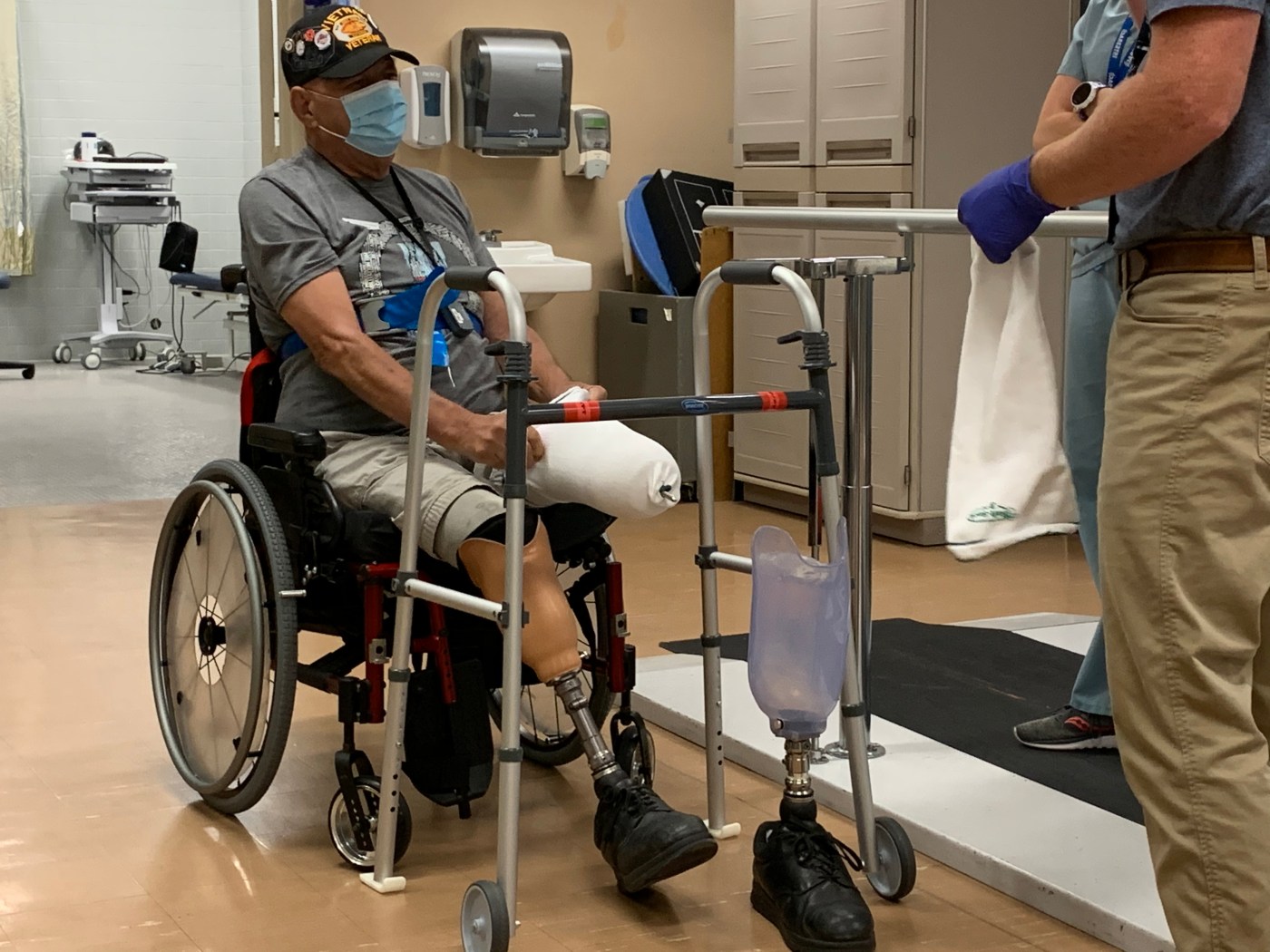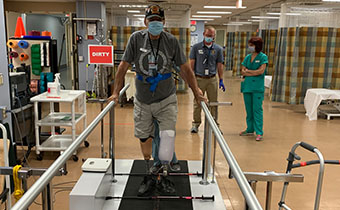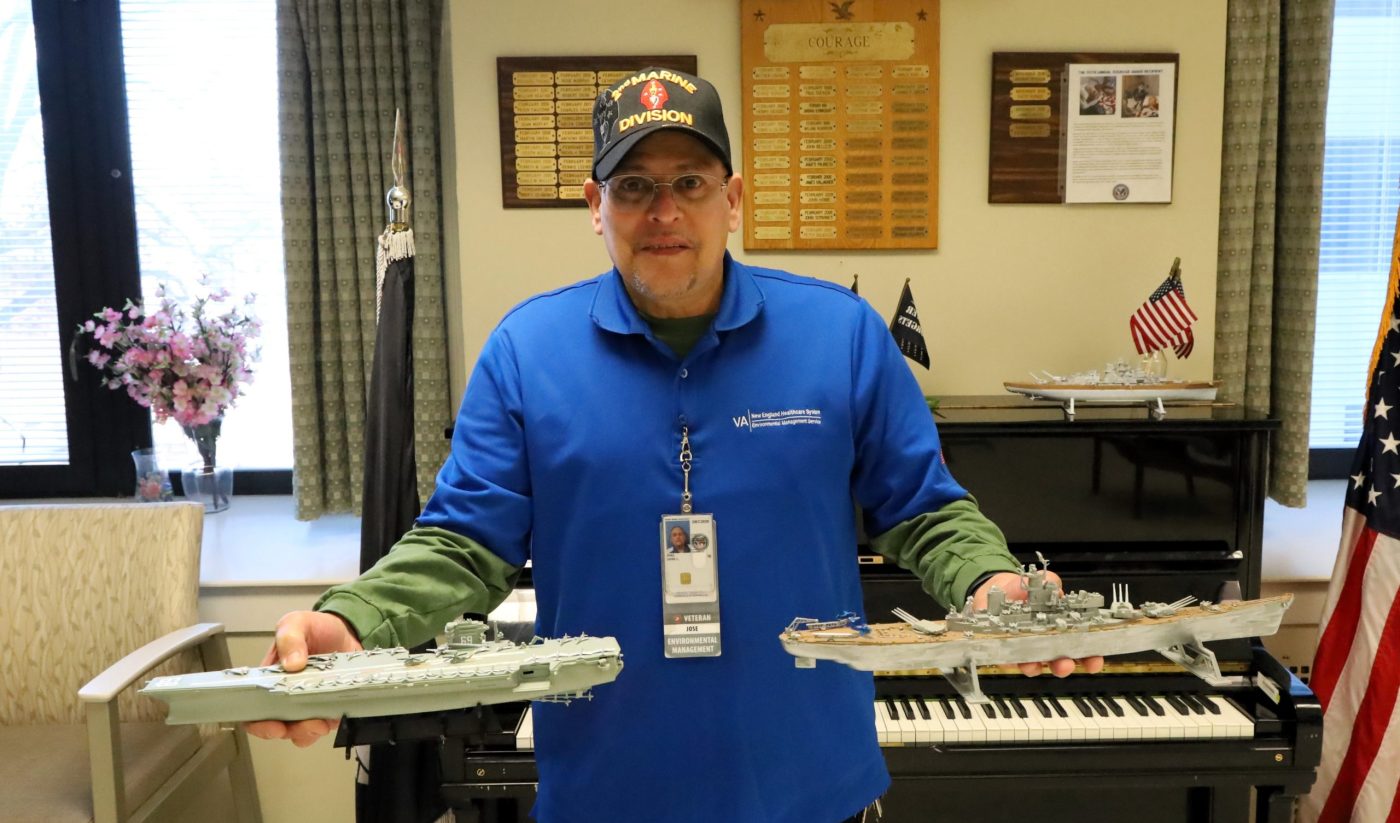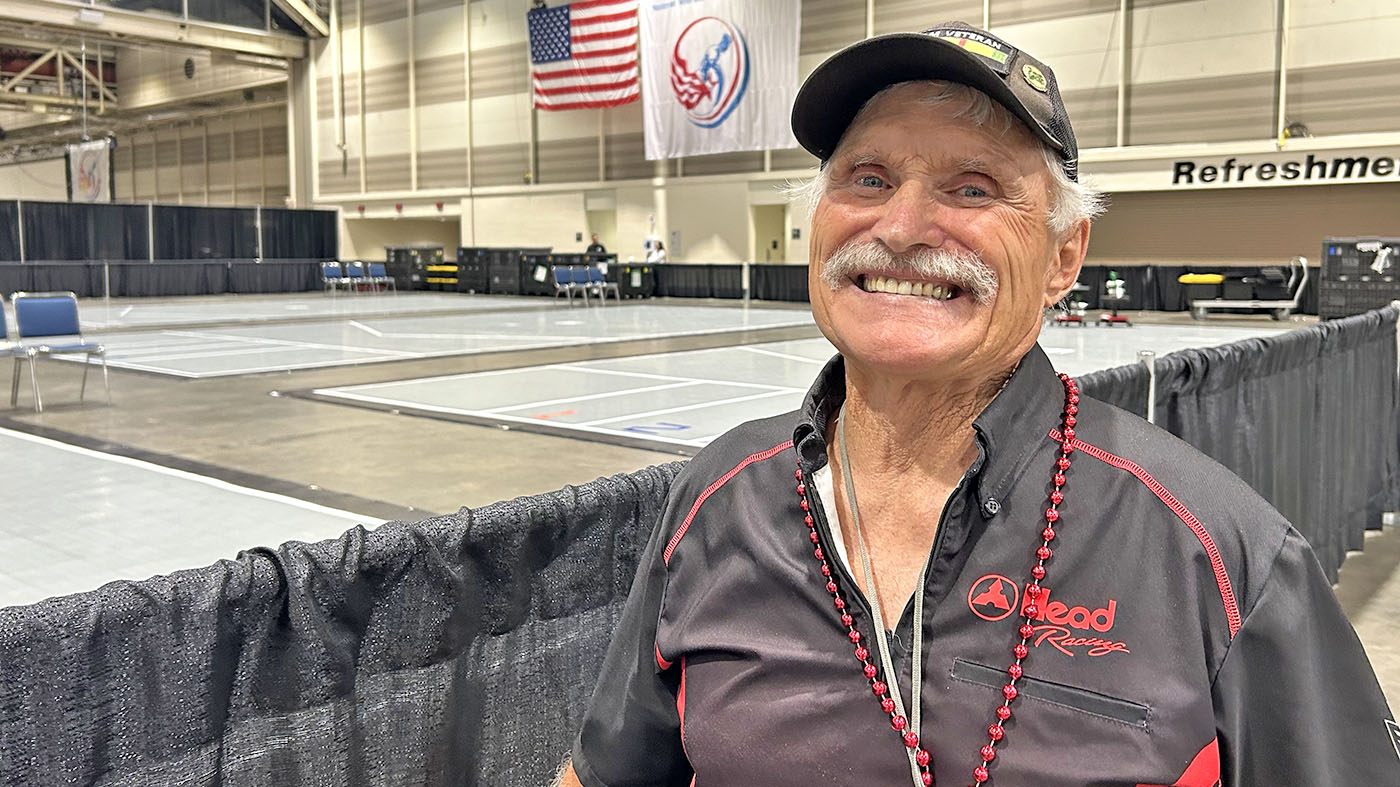He’s had triple bypass surgery, two leg amputations, gallbladder removal and eye surgery.
So how does Jim Jacobi feel?
“I feel healthier now at (age) 75 than I did at 50,” said the U.S. Army Veteran. “I’ve had a lot of things done to me, but I feel healthier now (because of) my attitude and the (Milwaukee) VA.
“I just have a positive attitude about everything.”
For many, the ravages of disease and age take their toll mentally as well as physically. But Jacobi, a Milwaukee native who served one year in Vietnam after being drafted in 1965, has chosen a different path.
“It’s better to be happy and friendly,” he said. “When I was 50, I said, ‘You gotta be happy. Don’t let things bother you.’”
And he has stuck by that philosophy, tackling his various physical ailments with determination and fortitude that belie his age.
“He’s unique, he’s an outlier,” said Milwaukee VA prosthetist Justin Heck. “He’s an inspiring guy.”
Sarah Mikesell, Jacobi’s physical therapist at the Milwaukee VA, agreed.
“Statistically, he’s an anomaly, being as old as he is and being able to walk with bilateral prostheses. That’s definitely against the odds.
“Jim is really super motivated. He does a good job taking care of himself and following through on recommendations. And he tries to share his good, positive attitude with everybody else.”
***

Jim Jacobi, a U.S. Army Veteran, stands with the help of physical therapist Sarah Mikesell at the Milwaukee VA Medical Center after putting on his new prosthetic leg.
Born and raised in Milwaukee, Jacobi was just a few months out of high school when his number came up.
His job in the Army was ordering food for the troops — 150,000 when he arrived and 200,000 by the time he was discharged.
“Me and the captain were the two people that ordered all the food for the II Corps,” he said. “When I left, the captain and I got replaced by a whole company.”
His job took him to the front lines, and he remembers being shelled by mortar fire his very first day in the country.
Somewhere along the way – he’s not sure when or how – he was exposed to Agent Orange. And that is what led to the disease that has gnawed away at him – diabetes.
Exposure to Agent Orange and other herbicides has been linked to the disease. And while heredity is also associated with diabetes, Jacobi said he’s the only member of his family to develop it.
After Vietnam, Jacobi worked in manufacturing for a number of years before opening a gas station. That eventually led to a job with a company that oversaw 13 convenience stores.
The work played to Jacobi’s strengths of being friendly and outgoing.
“I realized that in a factory, you see the same people every day,” he said. “When I was working for the convenience stores, I would be going to different stores. I had a lot of people working for me, and I got to know some of the customers. I’m more of a people-oriented person.”
***
It wasn’t long after Jacobi’s retirement when the diabetes began to take its toll.
He remembers getting an infection in the big toe on his right leg. A month later, all of his toes on his right foot had to be amputated.
“Since I’ve had this, I’ve downhill skied, curled and went sailing on Lake Michigan, all through SCI recreation. We play bocce ball, we bowl, we do air rifles, archery, kayaking, bicycling — I do all of that.”
— Jim Jacobi, talking about how his life changed after losing his first leg.
Three years later, the leg had to be amputated. Jacobi was fitted with a prosthetic, and within months he was walking again. But that wasn’t all. Besides hooking up with the Walk a Mile or More group of Veterans at the Milwaukee VA, Jacobi also became involved with recreation groups through the Spinal Cord Injury center.
“Since I’ve had this,” he said, pointing to his first prosthesis, “I’ve downhill skied, curled and went sailing on Lake Michigan, all through SCI recreation. “We play bocce ball, we bowl, we do air rifles, archery, kayaking, bicycling – I do all of that.”
He found a “great bunch of guys” at the SCI and WAMM, which gathers three days a week at Lake Wheeler on the Milwaukee VA campus not only to walk for exercise but also to socialize.
“You meet such wonderful people,” he said. “It’s amazing.”
Before the COVID-19 pandemic hit, he also went on outings to Harley-Davidson and organized bicycle rides on the Hank Aaron Trail. He and his buddies would also serve free coffee once a week at the hospital’s South Entrance.
***
But diabetes wasn’t done with Jacobi yet.
A familiar scenario began last summer when the little toe on Jacobi’s left leg had to be amputated. The remaining toes were taken in succession within months.
In February, he was back in the hospital, having his remaining leg amputated.
During his recovery, his friends would drop by his room every day, doing what they could and bringing him anything he needed.
“The nurses on the seventh floor, they were amazed I would have about 10 guys visiting me before the virus shut it down,” he said. “They’re great buddies… They’re always there to help you. And I’m the same way – I’ll do anything I can to help them.”
In June, Jacobi was fitted with his new prosthesis, and physical therapy began again.
He hasn’t been able to take it home yet – it’s still being tweaked. Meanwhile, the remainder of his left leg continues to heal after the amputation.
As is his nature, Jacobi has not seen this latest amputation as a roadblock, but merely a hurdle to get over.
“My goal is to walk without any device – no walker, no cane – by the end of the summer,” he said.
And according to the experts, he’s likely to do it.
“I think he’s on track,” Mikesell said.
Heck agreed.
“It’s all him. He wants to do it,” Heck said. “How positive he is – that’s the hardest part.
“Physically, we know people can walk or stand with the prosthetics. That’s fairly simple. To do it well and stay positive and work at it every day – that’s the hard part.”
***
Diabetes threw Jacobi another curveball in June.
He woke up one Sunday morning and noticed his vision was impaired.
“I think everybody at the VA hospital is so caring. I have a lot of buddies, a lot of Veterans, and I’ve not heard one person complaint about VA.”
— Jim Jacobi talks about the care he receives at the Milwaukee VA Medical Center.
“It was like hair was hanging in my eye,” he said. “But I don’t have any hair.”
After talking with his primary care physician’s nurse on Monday, Jacobi walked into the eye clinic at the Milwaukee VA the next day and had laser surgery on the spot.
As Jacobi explained it, the diabetes led to the formation of blood vessels in the back of his eye.
“It looks like hair, but it’s actually blood,” he said.
Jacobi has one more procedure for the eye, scheduled in August.
***
Through all of this, Jacobi has continued to maintain his positive, upbeat attitude while lauding the care he has received at the Milwaukee VA.
“I think everybody at the VA hospital is so caring,” he said. “I have a lot of buddies, a lot of Veterans, and I’ve not heard one person complain about the VA.”
His health care providers at the Milwaukee VA are equally as appreciative of Jacobi.
“Jim’s a really good advocate for himself and other amputees,” Mikesell said, noting that Jacobi annually volunteers to work with students in training to be physical therapists. “He’s willing to share his knowledge and wisdom.”
“He has been an advocate for other Veterans as well as for the workers here,” Heck said.
Jacobi has a theory about people, saying 25% have “wonderful attitudes,” 50% have “normal” attitudes and the remaining 25% have “negative” attitudes.
“That’s just the way it is,” he said. “I wish we could get to that 25% who are angry.
“I see patients when I’m in the hospital, and some guys are so grumpy and negative. That’s a shame to see,” he said.
“It’s better to have a positive attitude. You make everybody else feel positive too.”
Topics in this story
More Stories
One strategy credited for the improvement is a focus on building trust and stronger patient-provider relationships.
Army and Marine Corps Veteran started making models after being hospitalized at Connecticut VA.
Veteran Hank Ebert is a bit of a superstar in the National Veterans Wheelchair Games. He has been attending since 1993.







